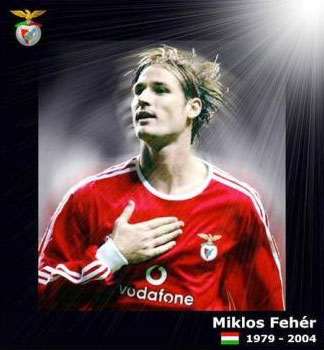Brew City Main | FA Cup | League Cup | Miklos Feher Cup | John Thomson Cup | Nationwide Super Cup | NPL History | Mug’O’Suds | MFLS Fantasy League | MFLS Prediction League | MFLS Champions League | MFLS Cup Winners Cup | Cup #8247 | Paper Cup

On January 25th, 2004, during a match between my favorite team Benfica and Vitoria Guimaraes, Miklos Feher suffered a heart attack on the pitch. He had come on as a substitute in the 60th minute looking to break a goaless draw. When Fernando Aguiar scored a late winner in the 88th minute, all that was left to do was hold on to the 1-0 lead. Guimaraes had the thrown in and Miklos Feher got in the way to kill time off the clock. He was rightfully booked for time wasting. As the referee showed Miklos the yellow card, Feher gave him a knowing sheepish smile. He then turned around, bent over as if to catch his breath, and then fell backwards laying lifeless on the pitch. It was immediately known that something was horribly wrong as players burst into tears and quickly tried to revive him. Head coach, Jose Camacho, and players prayed and wept and the EMTs could do nothing. It was a shock and a sad thing to see live on television.
Miklos Feher was a quiet and humble man who played for the love of his favorite game. He will be missed. This cup is dedicated in his memory to all that love and play the sport.
– Brian De Sousa
Here’s an article from Reuters the day of his death:
Sunday, January 25, 2004
Feher, 24, suffered heart attack
Reuters
LISBON — Benfica’s Hungarian international Miklos Feher died on Sunday after collapsing from a heart attack just before the end of a league game with Vitoria Guimaraes, a hospital spokesman said.
The 24-year-old striker was taken to a nearby hospital from the stadium in Guimaraes after falling to the ground in injury time.
Medical personnel struggled to save him for about 90 minutes “until about 11:10 p.m., without success, the player having died”, the spokesman told private radio station TSF.
Television reports said that emergency medical personnel had managed to revive Feher on the field using a defibrillator. However, his heart had stopped by the time he reached hospital. An autopsy is scheduled for Monday. This was the second on-the-field death of a professional soccer player within seven months.
TSF radio announcers at the game spoke of a delay in the arrival of the ambulance but Domingos Gomes, a UEFA doctor, told RTP state television that despite “access difficulties” impeding the ambulance Feher had received adequate care. “Everything was quick,” Gomes said.
Asked by TSF about the apparent delay in the ambulance’s arrival, Gilberto Madail, chairman of the Portuguese Soccer Federation, said the dispatch of an ambulance was uncommon. He said Benfica personnel normally could deal with a heart attack.
“I don’t know, but I presume that an ambulance would only enter when the doctors attending the player asked for it to come in,” Madail said.
Feher had come on as a substitute after 60 minutes.
He bent over and then fell on his back. Team mates rushed to his side and one cradled his head.
When team medics tried to revive him, some Benfica players kneeled to pray while others were crying, including coach Jose Antonio Camacho.
Feher came to Portugal to play for Porto in the 1998/99 season from Hungary’s Gyor Eto. He was traded to Benfica in 2002/03 season after being lent to Salgueiros and Braga.

